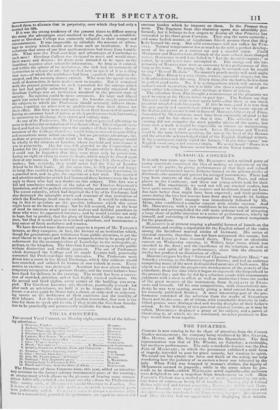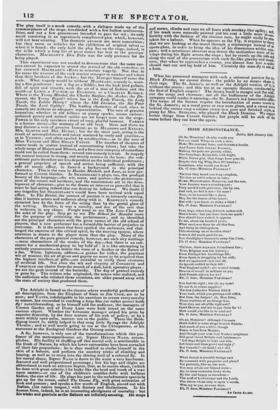THE THEATRES.
COMEDY is now coming in for its share of attention from the Covent Garden management ; the company being reinforced by Mrs. GLOVER, Mrs. Humpy, and Mr. STRICK AND, from the Haymarket. The first representation was that of The Wonder, on Saturday ; a creditable, but mediocre performance. The only remarkable feature was the Dam Felix of MAI:READY ; in which the personator exhibited a mild lona of tragedy, intended to pass for grave comedy, but wanting its spirit. We could not but admire tile force and finish of the acting, nor help wondering how the jealousy of so austere a lover was tolerated by the lady. When Felix was wrapped in woman's clothes, the dignity of Melpomene seemed in jeopardy ; while in the scene where be pre- tends to be drunk—which MACREADY acted capitally—the audience were delighted to see a tragedian feign drunkenness so well. Miss IA VCIT'S Violanle was a studied piece of artili,.c. hy one soli- tary buret of neture—a hearty tit of laughter. VI e I .■C 1.1 Cohnui Beitmt with ,tilf atid formal p:oprety ; G■It'tie :11;•I I IAM- ;oNt)'s J.fSSillll vere tante hold coar,'Ittiotri! ; ;,:o1a A,Li, eteeets and .11 Lwow e, as the two feoli.11 11111 Dint., were .4.o:eel:le: Ales. efi.oveu. and „Mrs. ilumisv bad no uppmluniiy fur di-playing their talent. The play itself is a mock comedy, with a dialogue made up of the commonplaces of the stage, interlarded with a few hollow sentimenta- lities, and not a few grossnesses intended to pass for wit ; its only merit consisting in an ingeniously complicated plot, which, however, will not bear scrutiny. The dramatis persorie are mere nonentities ; but they serve as vehicles for the exhibition of oliginal talent....... when it is found : the only hold the play has on the stage, indeed, is the eclat which a long list of great names has lent to the principal characters. MACREADY'S Don Felix was the only pretence for its being played.
This experiment was not needed to demonstrate that the same suc- cess cannot be expected to attend the revival of the old comedies, as has crowned MACREADy's efforts to reinstate tragedy. Not that in his corps the wearers of the sock muster stronger in number and talent than their brethren of the buskin; but the Manager himself turns the scale. What tragedy would be without MACREADy, comedy is, want- ing a fine gentleman : not a fop or a fribble, but the high.bred gallant, full of spirit arid vivacity, with the air of a man of fashion and the world—a Lswis. a PAT SIER. an EINISToN, or a CHARLES KFINBLE. Where is the Young Mirabel, the Charles Surface, the Archer, the Do- ricourt, the Young Rapid? where too is the Lady rowdy, the Lady Teazle, the Letitia Hardy? where the Old Dornton, the Sir Peter Teazle, the Lord Ogleby? The leading charactets of each class in comedy are without an adequate representative. The race of genuine humorists, whether in old fellows or young sparks, seems extinct : unforced gayety and animal spirits are no longer seen on the stage. POWER is the only specimen extant of cal, playful humour. FARREN is a hortus siccus—the mummy of an old beau. Here and there we may discern a vein of genuine humour, as in MEADOWS and KEELEY, Mrs. GI.OVER and Mrs. HUNIBY ; but for the most part, acting is the result of accomplishment and talent matured by study and practice,— as in VESTRIS ; and often spoiled by misdirection,—as in the case of Miss TAYLOR and Miss HELEN FAUCIT. The number of theatres of -course tends to scatter instead of concentrating talent ; but take the whole range of Majors and Minors, and a first-rate company of comedians could not be culled from them : second. rate comedy is friste. In tragedy the natural interest is strong, and mostly centres in the hero : the sub- ordinate parts therefore are less dependent on the individual performers ; a general propriety of speech and action being sufficient, with the aids of scenic effect, to furni..11 a background to the principal character. This is the case in Hamlet, Macbeth, and Lear, as now per- formed at Covent Garden. In SHAKSFEARE'S plays, too, the prodigal beauty of the language—the wit, sense, and pathos—the picturesque- ness of the scenes and incidents, and the consummate art in the deve- lopment of character—give to the drama an intei est so powerful that it must be bad acting indeed that can destroy its influence. We doubt if any tragedies but SHAKSPEARE'S would have been revived with equal effect. In The Bridal, the contest of passion is so intensely exciting, that it hurries actors and audience along with it. KNOWLES'S comedy attracted less by the force of the acting than by the genial glow of the writing. Besides, it was a novelty, and One of the sort that is welcome in any shape. People went to see The Love. Chasefor the sake of the play : they go to see The School for Scandal more
for the purpose of criticizing the performance ; and so identified are the principal characters with the great names of the old school of players, that a new performer has a formidable barrier of prejudice to overcome. It is the actors that have spoiled the audiences, and chal- lenged the exercise of this critical spirit, by the starring system, where attention is drawn to the player more than the play. Many of the characters of the pure genteel comedy, however, are such airy nothings —mere abstractions of the modes of the day—that there is no sub- stance for a mechanical grasp to lay hold of : it is like attempting to embody evanescence—to mimic the wave of a feather or the flutter of a fan. Whim, lightness, address—a genius for trifles, the practical wit of manner, the air of grace and gayety no more to be acquired than the highest intellecti.al gifts—are essential to vivify these creatures of artificial life. Not even the wit and vivacity of CoNGREVE and FARQUHAR can charm from the mouth of a dull, hard, operative player :
we see the grub instead of the butterfly. The day of genteel comedy is gone by. The writers who originated, the actors who realized, and the audiences who relished these creations, are alike passed away with -the state of society that produced them.



























 Previous page
Previous page